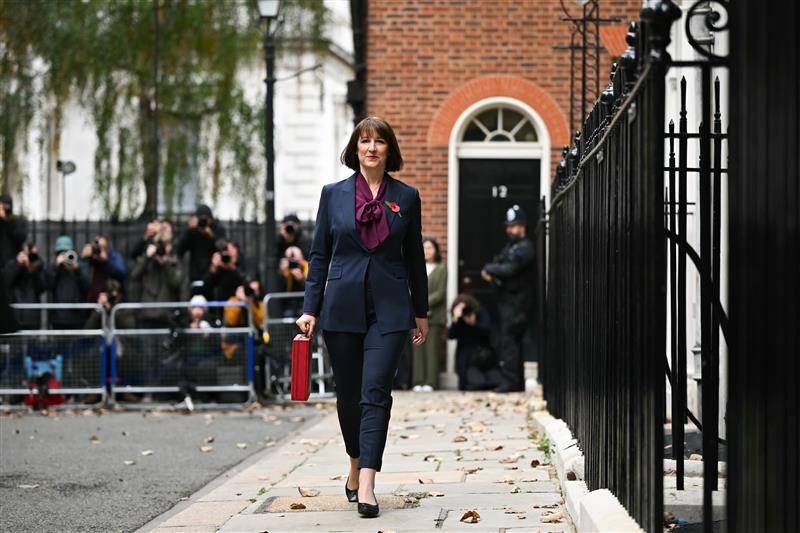Review of the week: The oracle of Threadneedle Street
No change to monetary policy is expected this week, but investors will be eager for any clue about the Bank of England’s thoughts on inflation and interest rate cuts.

Article last updated 30 September 2025.
Quick take:
- US and UK central banks are expected to keep rates flat when they meet this week
- US economic growth overshot expectations, falling from 4.9% to 3.3% in Q4
- Chinese authorities move to prop up stocks after big falls exacerbate recent losses by retail investors
The US Federal Reserve (Fed) and the Bank of England (BoE) will both discuss monetary policy this week. We don’t expect any action – since the autumn we’ve been saying that the US, Eurozone and UK rate-tightening cycles are over. The broader market suggests this is now consensus, yet many investors will be monitoring the tone coming from Threadneedle Street. Before Christmas the Fed shifted from considering whether to hike interest rates to considering whether to cut. The BoE hasn’t made this change, despite increasing evidence that the UK economy is flatlining. At its last monetary policy meeting on 13 December, the committee voted 6-3 to keep rates at 5.25% (three voted to raise rates by 25 basis points). It will be interesting to see whether any members change their votes – especially if the dissenters start arguing for a prospective cut rather than a prospective hike. For now, most BoE watchers are expecting a May reduction to 5.00%.
The BoE’s CPI inflation forecast will be something to watch as well. In December, the committee assumed inflation would hit the 2% target at the end of 2025. It’s possible that this could be revised to hit target by halfway through this year, i.e. a full 18 months earlier. While inflation ticked up slightly to 4% at its last reading, there are big falls highly likely to come through from food prices (because consumer food prices tend to follow producer food prices from the factory gate with a six-month lag). There may also be a 10% fall in gas and electricity prices coming through in April. Whether the BoE agrees will be an interesting nugget of information as to whether that May cut will come to pass. The countervailing argument for the BoE holding rates where they are for longer would be wage growth, which is still growing at a reasonable clip. Leading indicators point to slower wage growth ahead, but the Office for National Statistics is struggling to collect labour market data at the moment. Britain is hard to read right now. A retail sales slump flashing recession followed by a consumer confidence jump to a two-year high sums it up. While we believe inflation should fall back to healthy levels, we think economic growth will disappoint.
The same can’t be said of the US, which is riding a Goldilocks wave of helpful data. Inflation is on a downward trend, yet GDP growth remains stronger than expected. The annualised rate of economic growth dropped from 4.9% to 3.3% in the fourth quarter. It had been forecast to drop to 2.0%. Still, while the American stock market has been a roaring success on the surface, it’s not been a widespread phenomenon.
Five of the Magnificent Seven stocks report their fourth-quarter earnings this week, which will set the mood for the rest of the market. The Magnificent Seven are the large American stocks that drove most of the nation’s stock market returns over 2023: search giant Alphabet, e-commerce empire Amazon, gadget-maker and mobile marketplace ecosystem Apple, social media conglomerate Meta, office computing titan Microsoft, high-end computer chip designer Nvidia and electric car builder Tesla.
A quarter of S&P 500 companies have reported their results so far, with roughly 70% beating analyst forecasts for sales and profit. The Magnificent Seven – well, except Tesla – are expected to drive fourth-quarter profits higher too. Combined, the expected profits of the Magnificent Seven ex Tesla are 54% higher in Q4 compared with a year earlier. If you remove those companies, the rest of the S&P 500 is expected to report profits that are 11% lower than Q4 2022. It gets even wilder when it comes to forecasts of Q1 earnings. The pool of profits for Amazon, Google, Meta and Nvidia are expected to rise by a spectacular 80% compared with Q1 2023. Meanwhile, the rest are expected to post just 0.3% growth.
This outsized reliance on incredible performance from a handful of stocks increases the chances of market-wide disappointment, in our view. What if Meta’s profits rise by only 150% this quarter, rather the 175% expected, for example?
| Index |
1 week |
3 months |
6 months |
1 year |
| FTSE All-Share |
2.3% |
6.1% |
1.5% |
2.0% |
| FTSE 100 |
2.3% |
4.5% |
1.3% |
2.3% |
| FTSE 250 |
2.5% |
16.0% |
2.5% |
0.5% |
| FTSE SmallCap |
1.8% |
12.4% |
3.0% |
0.2% |
| S&P 500 |
0.7% |
13.2% |
9.7% |
18.9% |
| Euro Stoxx |
3.0% |
12.3% |
4.8% |
8.0% |
| Topix |
-0.8% |
8.9% |
6.6% |
10.8% |
| Shanghai SE |
2.6% |
-5.4% |
-8.7% |
-18.3% |
| FTSE Emerging |
1.2% |
3.5% |
-0.6% |
-5.2% |
Source: EIKON, data sterling total return to DATE
| These figures refer to past performance, which isn’t a reliable indicator of future returns. The value of investments and the income from them may go down as well as up and you may not get back what you originally invested. |
Yet more losses for Chinese retail investors
Meanwhile, a brace of worrying developments emerged in China last week. The stock market has continued to slide lower over the past year, yet losses have accelerated in the past few months.
The Shanghai Composite index hit its lowest level since 2020 last week. Yet the slump in the CISI SmallCap 500 Index, which tracks much smaller companies that tend to be very popular with local investors, has been much worse. At first, the government prompted state-controlled companies to buy stocks to support the ailing market. According to Bloomberg, China suggested mobilising 2 trillion yen ($278 billion) of offshore cash to buy Chinese stocks. This caused a short-lived rally that soon deflated and went backwards. Cue Chinese regulators limiting the ability to short-sell stocks (i.e. bet that stocks will fall).
Governments don’t appreciate stock market falls at the best of times. Yet it’s particularly unwelcome for China right now because of a proliferation of complex structured products that were sold to many retail investors several years ago. Called ‘snowballs’ these investments use derivatives to offer attractive interest payments in return for taking capital losses if stock markets fall below a certain level. Those levels are now being breached and investors are facing the prospect of large losses if markets don’t rebound.
Snowballs are just another in a long line of retail investment product blow-ups that will be frustrating the Chinese top brass. Yet the number one biggest problem in this sphere is the slow bursting of the property bubble after years of overbuilding and rampant speculation. Chinese investors are already nursing big losses in property. However, on Monday, yet another step was taken in the long slow walk. A Hong Kong court ordered the liquidation of Evergrande, one of China’s largest property developers. Evergrande first defaulted on its debts back in 2021 and has been a zombie since, wandering from court hearing to court hearing. Now roughly $300 billion of debts will need to be unwound, and outside officers will move in to sell the company’s assets to raise as much cash as possible to repay its creditors.
Of course, that’s if the liquidators are allowed to do so. Hong Kong is firmly the junior partner in the Greater China relationship and it remains to be seen if this court order will be allowed to wind up projects and businesses predominantly on the Mainland. If the liquidation goes ahead, recovery rates are forecast to be below 5%. That includes investors and homeowners that prepaid for units and houses. There’s apparently 1.5 million of them. A 95% haircut on an investment in a home you never receive is life-crushing.
And then there are the big losses that banks and subcontractors will have to swallow. Evergrande isn’t the only Chinese housebuilder teetering on insolvency either. You can see why it’s a headache for Chinese leaders.
This time last year it was very unpopular to be bearish on China, but we stuck to our guns. It’s now firmly consensus, however, and we’re starting to debate whether it’s time to take a different view.
If you have any questions or comments, or if there’s anything you would like to see covered here, please get in touch by emailing review@rathbones.com. We’d love to hear from you.



